Pakistanism or Pakistanization [1] is a neologism that refers to the continual division of any society along religious lines.[ citation needed ]
In Europe, Alija Izetbegović, the first President of the Republic of Bosnia and Herzegovina, began to embrace the "Pakistan model" in the 1960s, alienating Serbs who would use this ideology to attack Bosniaks later on, [2] while in his Islamic Declaration he "designated Pakistan as a model country to be emulated by Muslim revolutionaries worldwide." [3]
Some West Africans were inspired by the Indian independence movement. [4] In 1920, educated West Africans formed the National Congress of British West Africa, which modeled its name on the Indian National Congress. [5] According to Ali Mazrui, the facet of the Indian independence movement West Africans found most admirable was the Indian peoples' unity during the struggle. [4] In 1936, H. O. Davies said,
"Africans should follow India – the only way is for Africans to co-operate and make sacrifices in the struggle for freedom." [4]
According to Ali Mazrui,
"But the emergence of the Muslim League in India as a serious secessionist movement soon shattered the myth of unity in the Indian model. A new word entered the vocabulary of West African nationalism – the word was 'pakistanism'." [4]
Ghana's Kwame Nkrumah and Nigeria's Nnamdi Azikiwe became concerned about possible Pakistanization in their respective countries and Africa as a whole. [4] [6] [7] The Convention People's Party's 1954 Election Manifesto contain the following message:
"We have seen the tragedy of religious communalism in India and elsewhere. Don't let us give it a chance to take root and flourish in Ghana. Down with Pakistanism!" [8]
Pakistanism became a concern in Nigeria's independence movement. The primary subdivisions of Nigeria consisted of the Hausa-Fulani-dominated Northern Region, the Yoruba-dominated Western Region, and the Igbo-dominated Eastern Region. In addition to these ethnic differences, the Northern Region was primarily Muslim, while the Western and Eastern regions were primarily Christian. In the 1950s, the Northern Region threatened to secede. Godfrey Mwakikagile noted that it was the Northern region that was the first region threatening to secede. [9] At the 1950 General Conference at Ibadan, Northern Region delegates demanded 50% of the seats in Nigeria's legislature and threatened secession otherwise. [9] In 1958, Nnamdi Azikiwe said:
"It is essential that ill-will be not created in order to encourage a Pakistan in this country." [4] [7]
The original goal of the countercoup against the government of Johnson Aguiyi-Ironsi on July 29, 1966, was to facilitate the Northern Region's secession from the rest of Nigeria. [10]
In February 2011, Mazrui used the term to describe the division of the Sudan into Sudan proper, which is primarily Muslim, and South Sudan, which is primarily Christian and animistic. [6]
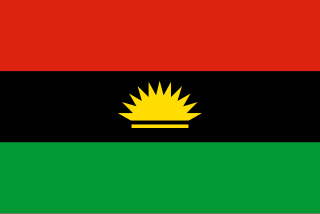
Biafra, officially the Republic of Biafra, was a partially recognised country in West Africa that declared independence from Nigeria and existed from 1967 until 1970. Its territory consisted of the former Eastern Region of Nigeria, predominantly inhabited by the Igbo ethnic group. Biafra was established on 30 May 1967 by Igbo military officer and Eastern Region governor C. Odumegwu Ojukwu under his presidency, following a series of ethnic tensions and military coups after Nigerian independence in 1960 that culminated in the 1966 anti-Igbo pogrom. The Nigerian military proceeded to attempt to reclaim the territory of Biafra, resulting in the start of the Nigerian Civil War. Biafra was formally recognised by Gabon, Haiti, Ivory Coast, Tanzania, and Zambia while receiving de facto recognition and significant military support from France. After nearly three years of war, during which around two million Biafran civilians died, President Ojukwu fled to Ivory Coast in exile as the Nigerian military was approaching the capital of Biafra. Philip Effiong became the second president of Biafra, and he oversaw the surrender of Biafran forces to Nigeria.
Secession is the formal withdrawal of a group from a political entity. The process begins once a group proclaims an act of secession. A secession attempt might be violent or peaceful, but the goal is the creation of a new state or entity independent of the group or territory from which it seceded. Threats of secession can be a strategy for achieving more limited goals.

Nnamdi Benjamin Azikiwe, PC, usually referred to as "Zik", was a Nigerian statesman, revolutionary and political leader who served as the 3rd governor-general of Nigeria between 1960 and 1963 and the 1st president of Nigeria during the First Nigerian Republic which existed from 1963 to 1966. Considered a driving force behind the nation's independence, he came to be known as the "father of Nigerian nationalism".

The Siddi, also known as the Sheedi, Sidi, or Siddhi, are an ethnic minority group inhabiting Pakistan and India. They are primarily descended from the Bantu peoples of the Zanj coast in Southeast Africa and Ethiopia, most of whom came to the Indian subcontinent through the Arab Slave Trade. Others arrived as merchants, sailors, indentured servants, and mercenaries. The Siddi population is currently estimated at around 1,300,000 individuals, with Karachi and Makran in Pakistan and Karnataka and Gujarat in India serving as the main population centres.

The Pakistan Movement was a nationalist and political movement in the first half of the 20th century that aimed for the creation of Pakistan from the Muslim-majority areas of British India. It was connected to the perceived need for self-determination for Muslims under British rule at the time. Muhammad Ali Jinnah, a barrister and politician led this movement after the Lahore Resolution was passed by All-India Muslim League on the 23rd of March 1940 and Ashraf Ali Thanwi as a religious scholar supported it.
The Nigerian Youth Movement (NYM) was Nigeria's first genuine nationalist organization, founded in Lagos in 1934 at Stanley Orogun, with Professor Eyo Ita as the founding father and many others, including Samuel Akisanya. Ernest Ikoli, the first editor of the Daily Times of Nigeria, which was launched in the month of June 1926, was another founding member. Immediate concerns included the supposedly inferior status of Yaba College, appointments of Africans to senior positions in the civil service and discriminations against the African truck drivers. However, the Lagos-based organization at first, has generally moderate views and pledged to support and co-operate with the governor. The president was Dr Kofo Abayomi. Ernest Ikoli was vice president and H.O. Davies was the secretary. It was the first multi-ethnic organization in Nigeria and its programme was to foster political advancement of the country and enhance the socio-economic status of the Nigerian citizens. Adeyemo Alakija later became President of the NYM.
The National Council of Nigeria and the Cameroons (NCNC) later changed to the National Convention of Nigerian Citizens, was a Nigerian nationalist political party from 1944 to 1966, during the period leading up to independence and immediately following independence.
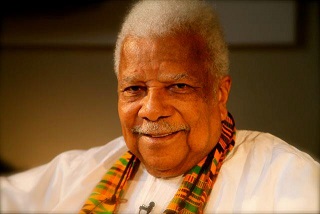
Ali Al'amin Mazrui, was a Kenyan-born American academic, professor, and political writer on African and Islamic studies, and North-South relations. He was born in Mombasa, Kenya. His positions included Director of the Institute of Global Cultural Studies at Binghamton University in Binghamton, New York, and Director of the Center for Afro-American and African Studies at the University of Michigan. He produced the 1980s television documentary series The Africans: A Triple Heritage.
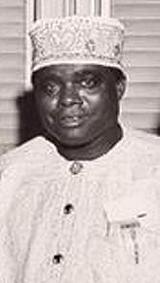
Jaja Anucha Ndubuisi Wachuku was a Pan-Africanist and a Nigerian statesman, lawyer, politician, diplomat and humanitarian. He was the first Speaker of the Nigerian House of Representatives; as well as the first Nigerian Ambassador and Permanent Representative to the United Nations. Also, Wachuku was the first Nigerian Minister for Foreign Affairs. Notably, Wachuku was a Royal Prince of Ngwaland, "descendant of 20 generations of African chiefs in the Igbo country of Eastern Nigeria".

The First Republic was the republican government of Nigeria between 1963 and 1966 governed by the first republican constitution. The country's government was based on a federal form of the Westminster system. The period between 1 October 1960, when the country gained its independence and 15 January 1966, when the first military coup d’état took place, is also generally referred to as the First Republic. The first Republic of Nigeria was ruled by different leaders representing their regions as premiers in a federation during this period.
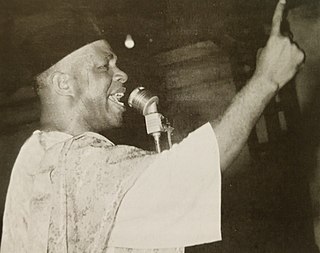
Kingsley Ozumba Mbadiwe (1915–1990) was a Nigerian nationalist, politician, statesman, and government minister in the Nigerian First Republic and a Biafran Roving ambassador during the civil war.

Black orientalism is an intellectual and cultural movement found primarily within African-American circles. While similar to the general movement of Orientalism in its negative outlook upon Western Asian – especially Arab – culture and religion, it differs in both its emphasis upon the role of the Arab slave trade and the Coolie slave trade in the historic relationship between Africa and the Arab – and greater Muslim – world, as well as a lack of colonial promotion over the Middle East region as was promoted by European orientalism in the same region. The term "black orientalism" was first used by Kenyan academic Ali Mazrui in his critique of Henry Louis Gates, Jr.'s documentary Wonders of the African World. Supporters of this movement include writers such as Chinweizu.
Zikism is the system of political thought attributed to Nnamdi Azikiwe ("Zik"), one of the founding fathers of modern Nigeria and the first democratically elected President of Nigeria. Azikiwe expanded on this philosophy through his published works, such as Renascent Africa (1973) and his autobiography My Odyssey.
Eyo Ita (1903–1972) was a Nigerian educationist and politician from Creek Town, in present-day Cross River State, who was the leader of the Eastern Government of Nigeria in 1951 and the first Professor Nigeria ever had. He was one of the earliest Nigerian students who studied in the United States instead of the frequent route of studying in the United Kingdom. He was a deputy national president of the National Council of Nigeria and the Cameroons (NCNC) in the late 1940s and early 1950s.
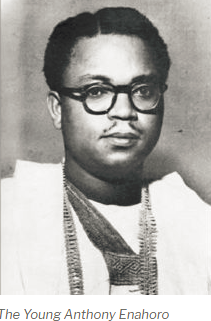
Chief Anthony Eromosele Enahoro was one of Nigeria's foremost anti-colonial and pro-democracy activists.
Hezekiah Oladipo Davies, Q.C. was a leading Nigerian nationalist, founding father, lawyer, journalist, trade unionist, thought leader and politician during the nation's movement towards independence in 1960 and immediately afterwards.
Godfrey Mwakikagile is a Tanzanian scholar and author specialising in African studies. He was also a news reporter for The Standard — the oldest and largest English newspaper in Tanzania and one of the three largest in East Africa.
The West African Pilot was a newspaper launched in Nigeria by Nnamdi Azikiwe ("Zik") in 1937, dedicated to fighting for independence from British colonial rule. It is most known for introducing popular journalism within Nigeria. The main focus of the newspaper was to promote Nigerian independence from colonial rule. Football was a topic often used within the media to promote these various arguments of independence. With humanistic language and powerful ideas, the West African Pilot successfully promoted the humanity of African workers in this colonized world. The newspaper dismissed the idea that sports and politics are to be separated, further supporting African's connection to the game and adding specific cultural impact to the game itself; this supported a new kind of identity pertinent to the Nigerian people. Through fictional stories and football centered symbolism, the newspaper was even said to have, "created the possibility of a new form of imagined community", setting the stage for how a modern society should be.

Nigerian nationalism asserts that Nigerians as a nation should promote the cultural unity of Nigerians. Nigerian nationalism is territorial nationalism and emphasizes a cultural connection of the people to the land, particularly the Niger and the Benue Rivers. It first emerged in the 1920s under the influence of Herbert Macaulay, who is considered to be the founder of Nigerian nationalism. It was founded because of the belief in the necessity for the people living in the British colony of Nigeria of multiple backgrounds to unite as one people to be able to resist colonialism. The people of Nigeria came together as they recognized the discrepancies of British policy. "The problem of ethnic nationalism in Nigeria came with the advent of colonialism. This happened when disparate, autonomous, heterogeneous and sub-national groups were merged to form a nation. Again, the colonialists created structural imbalances within the nation in terms of socio-economic projects, social development and establishment of administrative centres. This imbalance deepened the antipathies between the various ethnic nationalities in Nigeria ." The Nigerian nationalists' goal of achieving an independent sovereign state of Nigeria was achieved in 1960 when Nigeria declared its independence and British colonial rule ended. Nigeria's government has sought to unify the various peoples and regions of Nigeria since the country's independence in 1960.